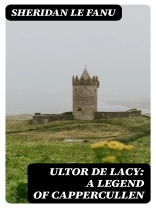In ‘Ultor de Lacy: A Legend of Cappercullen, ‘ Sheridan Le Fanu weaves a rich tapestry of Irish folklore and Gothic intrigue set against the backdrop of the hauntingly picturesque landscape of rural Ireland. The novel marries elements of legend and history, as it unfolds the tale of the eponymous hero, Ultor de Lacy, and his quest for redemption intertwined with themes of love, vengeance, and the supernatural. Le Fanu’s narrative style is characterized by his evocative prose, deft characterizations, and a world steeped in mythos, inviting readers into a deep historical context that highlights the tension between the ancient and modern Ireland of the 19th century. Sheridan Le Fanu, a prominent figure in Gothic literature and a precursor to the ghost story genre, draws upon his Irish heritage and the tumultuous history of 19th-century Ireland to create a compelling narrative filled with psychological depth. His experiences growing up in Dublin may have instilled in him a fascination with local legends and the ethereal mysteries of his homeland, which permeate his work and lend it a rich authenticity. ‘Ultor de Lacy’ is highly recommended for readers who appreciate a blend of historical fiction and Gothic horror. It will appeal to those who revel in richly-drawn characters, lyrical storytelling, and the exploration of the human psyche amidst supernatural elements, ensuring a captivating read that resonates with both haunting beauty and profound insights.
Об авторе
Joseph Sheridan Le Fanu (1814–1873) was an Irish writer best known for his contributions to the Gothic horror genre. Born in Dublin to a literary family, Le Fanu displayed an early interest in the world of prose and poetry. His education at Trinity College, Dublin, equipped him with a solid grounding in classics and law, but it was the world of letters that would become his true calling. Le Fanu’s work is typified by its chilling atmosphere, supernatural themes, and intricately woven narratives, qualities that are exemplified in his lesser-known novel ‘Ultor de Lacy: A Legend of Cappercullen, ‘ among other writings. His oeuvre also includes the famed ‘Carmilla, ‘ a vampire tale that predates Bram Stoker’s ‘Dracula’ and undoubtedly influenced it. Another significant work, ‘Uncle Silas, ‘ is a darkly psychological novel that deftly uses the tropes of the locked-room mystery within a Gothic setting. His literary style is noted for its detail-orientated description that often serves to render the mundane world with an air of eerie uncanniness. Scholars praise Le Fanu for his pioneering role in shaping the ghost story genre during the Victorian period. His works remain influential, continuing to haunt and entertain readers well beyond the centenary of his passing.












